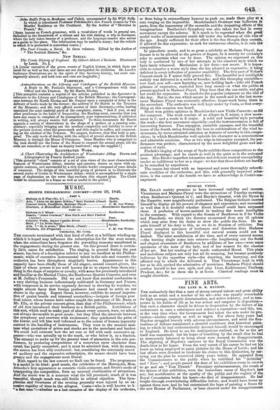MUSICAL UNION.
MR. ELLA'S society promises to have increased stability and success. Vieuxtemps and Madame Pleyel were the attractions of Tuesday morning; when Beethoven's Quintet in C, and Haydn's Quartet, with the Hymn to the Emp&or, were magnificently performed. The Belgian violinist exerted himself to display all his powers of elegance and expression; and succeeded so well that it is doubtful whether Sivori himself could have surpassed them. A profusion of scores assisted in making the music intelligible to the company. With regard to the Sonata of Beethoven in F for Violin and Pianoforte, we think the director exonerated from any ill opinion which may arise from his desire to show the public the lions. He ac- quits himself of his duty in this, as we do in freedom of criticism. But a more complete specimen of burlesque and distortion than Madame Pleyel displayed in this beautiful and natural sonata could not be desired. The utter annihilation of the time, and of every natural accent —the turning single notes into octaves—the lengthening out the florid and elegant ornaments of Beethoven by additions of her own—were some specimens of the taste of the lady, and of her respect for the classics of her art. But her reading of the rondo outheroded Herod. This plain and melodious subject not only lost all its meaning, but became positively ludicrous by the superfine style—the drawling, the hurrying, and the affected way in which she delivered it. That Vienxtemps kept in with her as he did, excited the admiration of musicians. Madame Pleyel should confine herself to her own style, and play Liszt, Kalkbrenner, Thalberg, Prudent, 8n3.; for in these she is at home. Classical readings must be sought elsewhere.


























 Previous page
Previous page